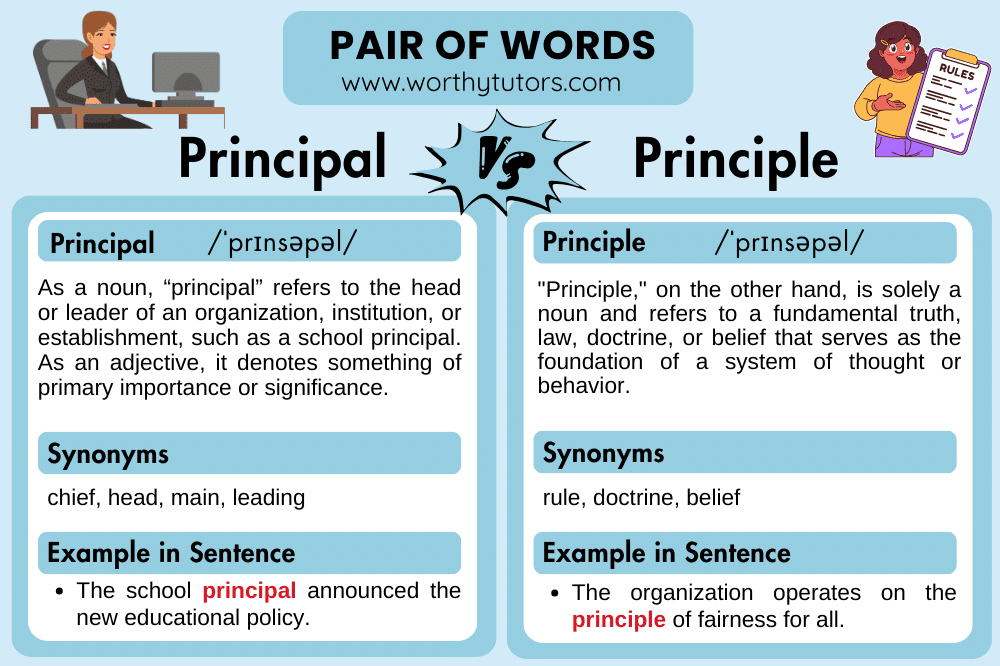
Difference Between Principal and Principle
The words “principal” and “principle” are often confused due to their similar pronunciation. However, they carry distinct meanings and are used in different contexts. This article will dissect these terms, providing a clear understanding of their pronunciation, synonyms, meanings, usage, and examples.
Principal
Pronunciation of Principal
Principal: /ˈprɪnsəpəl/ (prin-suh-puhl)
Meanings of Principal
The word “principal” functions both as a noun and an adjective. As a noun, it refers to the head or leader of an organization, institution, or establishment, such as a school principal. As an adjective, it denotes something of primary importance or significance.
Synonyms of Principal
- Head
- Chief
- Main
- Leading
Etymology and Explanation of Principal
Originating from the Latin word “princeps,” meaning “first” or “foremost,” “principal” embodies the idea of primacy or prominence. In various contexts, it signifies leadership, authority, or primary importance.
This term can describe a person in a leading position, such as a school principal, or the most important aspect of something, like the principal reason for a decision. It can also refer to the original sum of money in a financial transaction.
Example of Principal in Sentences
- The school principal announced the new educational policy.
- Her principal concern was the well-being of her family.
- He paid off the principal of the loan before the interest accrued.
- The principal reason for her success was her dedication and hard work.
- The principal ingredients in the recipe are flour and sugar.
Principle
Pronunciation of Principle
Principle: /ˈprɪnsəpəl/ (prin-suh-pl)
Meaning of Principle
“Principle,” on the other hand, is solely a noun and refers to a fundamental truth, law, doctrine, or belief that serves as the foundation of a system of thought or behavior.
Etymology and Explanation of Principle
Deriving from the Latin word “principium,” meaning “beginning” or “foundation,” “principle” embodies the concept of fundamental truths or rules guiding actions or judgments.
This term is used to denote a basic idea or rule that explains or controls how something happens or works. Principles are often used as the basis for a way of behaving or making decisions.
Synonyms of Principle
- Rule
- Tenet
- Doctrine
- Belief
Example of Principle in Sentences
- Freedom of speech is a fundamental principle of democracy.
- The organization operates on the principle of fairness for all.
- She stood by her principles, even when it was difficult.
- The principle of gravity explains why objects fall to the ground.
- Following ecological principles, they built a sustainable home.
Usage of Both Words
Principal is used when referring to a person with the highest authority or as a descriptor for the primary element of importance.
Principle is used to describe a fundamental rule or standard.
Key Difference Between Principal and Principle
While “principal” refers to a person in a position of authority or importance, “principle” pertains to a fundamental truth or belief guiding behavior or thought. The distinction lies in the roles they fulfill: “principal” is often associated with individuals or positions, while “principle” deals with concepts or ideals.
Summary
While “principal” and “principle” may sound alike, their meanings and applications are quite different. “Principal” can be a noun or an adjective and is associated with leadership or importance. “Principle” is always a noun and relates to fundamental truths or rules. Understanding the distinction between these two words is crucial for accurate communication and writing.
Fill in the Blanks Exercise Using Suitable Words Principal / Principle
- _____ is responsible for maintaining discipline in the school.
- Honesty is a _____ that should never be compromised.
- The _____ of physics governs the behavior of matter and energy.
- The _____ amount of the loan needs to be repaid first before interest.

About Authoress
Mahnoor Jehangir is a seasoned educator and linguist, specializing in English language and literature. With a master’s degree in English and applied linguistics, Mahnoor serves as a subject lead, while also indulging her passion for writing, exploring the nuances of language and storytelling.